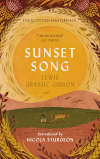Extracts from 'Sunset Song'

The following extracts were taken from the Canongate edition of 'Sunset Song' published in 2020.

'And she straightened as the moonlight grew and looked at the rest of herself, and thought herself sweet and cool ...'
'She was growing up limber and sweet, not bonny, perhaps, her cheek-bones were over high and her nose over short for that, but her eyes clear and deep and brown, brown, deep and clear as the Denburn flow, and her hair was red and was brown by turns, spun fine as a spider's web, wild, wonderful hair. So she saw herself and her teeth clean-cut and even, a white gleam in that grave brown stillness of face John Guthrie's blood had bequeathed to her. And below face and neck now her clothes were off was the glimmer of shoulders and breast and there her skin was like satin, it tickled her touching herself. Below the tilt of her left breast was a dimple, she saw it and bent to look at it and the moonlight ran down her back, so queer the moonlight she felt the running of that beam along her back. And she straightened as the moonlight grew and looked at the rest of herself, and thought herself sweet and cool and fit for that lover who would some day come and kiss her and hold her, so.' From The Song, Chapter II - Drilling, pages 72-73.Music in extract 1 is from the Glen Collection of printed music: 'Blar Sliabh an t-Shirra' [The Battle of Sheriffmuir]. Shelfmark: Glen.354.
'... nothing endured at all, nothing but the land she passed across ...'
'And then a queer thought came to her there in the drookèd fields, that nothing endured at all, nothing but the land she passed across, tossed and turned and perpetually changed below the hands of the crofter folk since the oldest of them had set the Standing Stones by the loch of Blawearie and climbed there on their holy days and saw their terraced crops ride brave in the wind and sun. Sea and sky and the folk who wrote and fought and were learnéd, teaching and saying and praying, they lasted but as a breath, a mist of fog in the hills, but the land was forever, it moved and changed below you, but was forever, you were close to it and it to you, not at a bleak remove it held you and hurted you. And she had thought to leave it all!' From The Song, Chapter III - Seed-Time, page 119.Music in extract 2 is from 'Slionar Eubh' agus Iolach [Many are the Cries and Shrieks of Woe]. Shelfmarks: Ing.157; Glen.383.
'... Chris stared at the places, sick and angry and sad for those folk she could never help now ...'
'They paid their shillings and the old man came with them from room to room, a scunner to Ewan, Chris guessed, for his eyes kept wandering, wearied, to her from this ruin and that. In walls little slits rose up, through these it was that in olden times the garrisons had shot their arrows at besiegers; and down below, in the dungeons, were the mouldering clefts where a prisoner's hands were nailed while they put him to torment. There the Covenanting folk had screamed and died while the gentry dined and danced in their lithe, warm halls, Chris stared at the places, sick and angry and sad for those folk she could never help now, that hatred of rulers and gentry a flame in her heart, John Guthrie's hate. Her folk and his they had been, those whose names stand graved in tragedy ...' From The Song, Chapter III - Seed-Time, page 125.Music in extract 3 is from 'Chiu ri ro'. Shelfmarks: Ing.157; Glen.383.
'... the barbed wire was alive, the lightning ran and glowed along it, a living thing, a tremulous, vibrant serpent ...'
'Right athwart her vision the haystacks alone shone up like great pointed pyramids a blinding moment, vanished, darkness complete and heavy flowed back on her again, the lantern-light seeking to pierce it like the bore of a drill. Still, the rain held off as she stumbled and cried down the sodden fields. Then she saw that the barbed wire was alive, the lightning ran and glowed along it, a living thing, a tremulous, vibrant serpent that spat and glowed and hid its head and quivered again to sight. If the horses stood anywhere near to that they were finished, she cried to them again and stopped and listened, it was deathly still in the night between the bursts of the thunder, so still that she heard the grass she had pressed underfoot crawl and quiver erect again a step behind her. Then, as the thunder moved away – it seemed to break and roar down the rightward hill, above the Manse and Kinraddie Mains,- something tripped her, she fell and the lantern-flame flared up and seemed almost to vanish; but she righted it, almost sick though she was because of the wet, warm thing that her body and face lay upon.'From The Song, Chapter III - Seed-Time, page 130.
Music in extract 4 is from 'Horin Ho Ro air nighean an airidh [The Dairyman's Daughter]'. Shelfmarks: Glen.350; Ing.203; Cb.2.

Extracts read by Lilian Ross.
Musical accompaniments in these extracts are performed by Music Curator Almut Boehme, using music from the Library's digitised special collections of printed music.